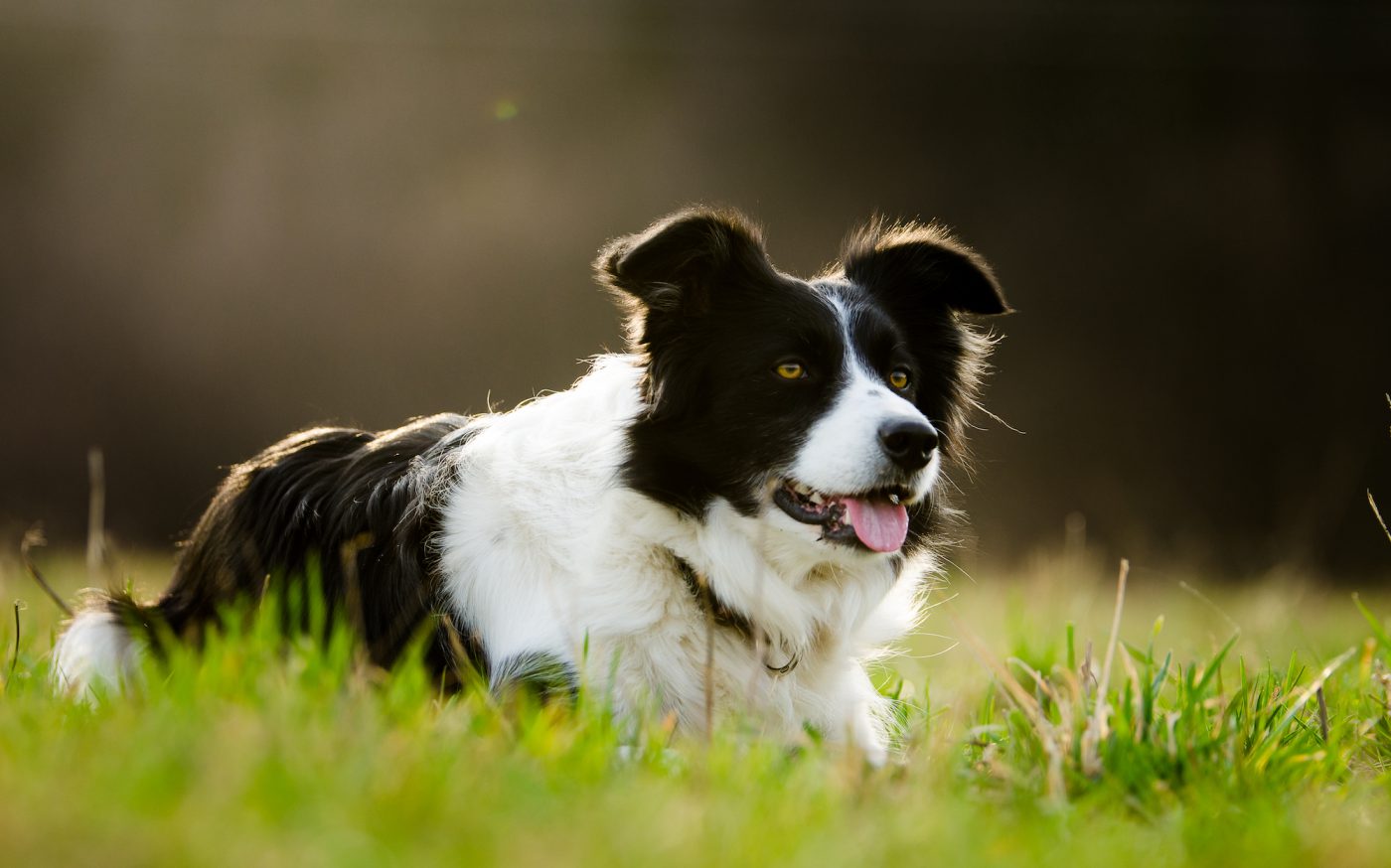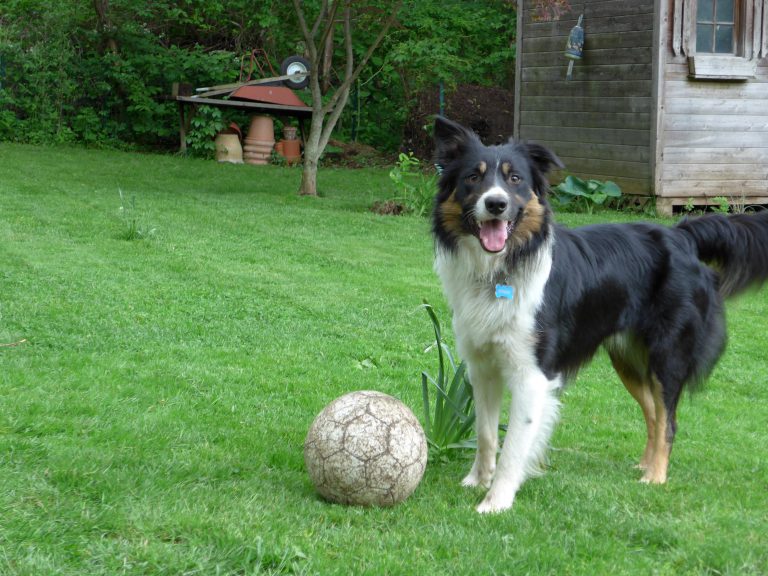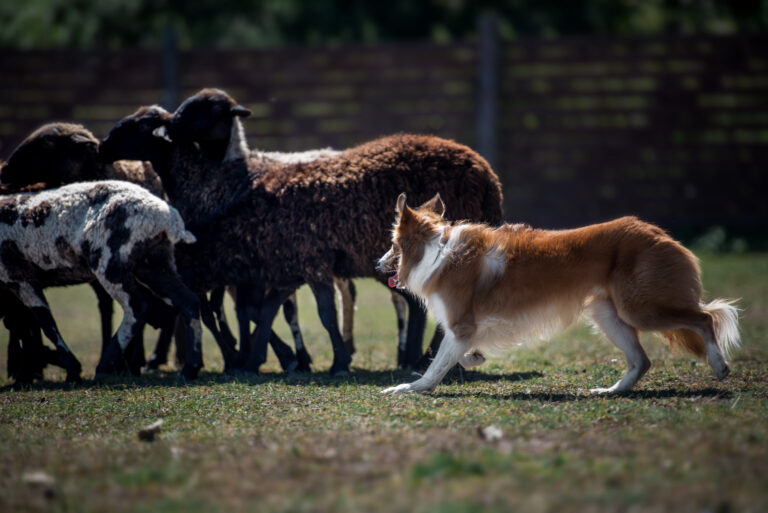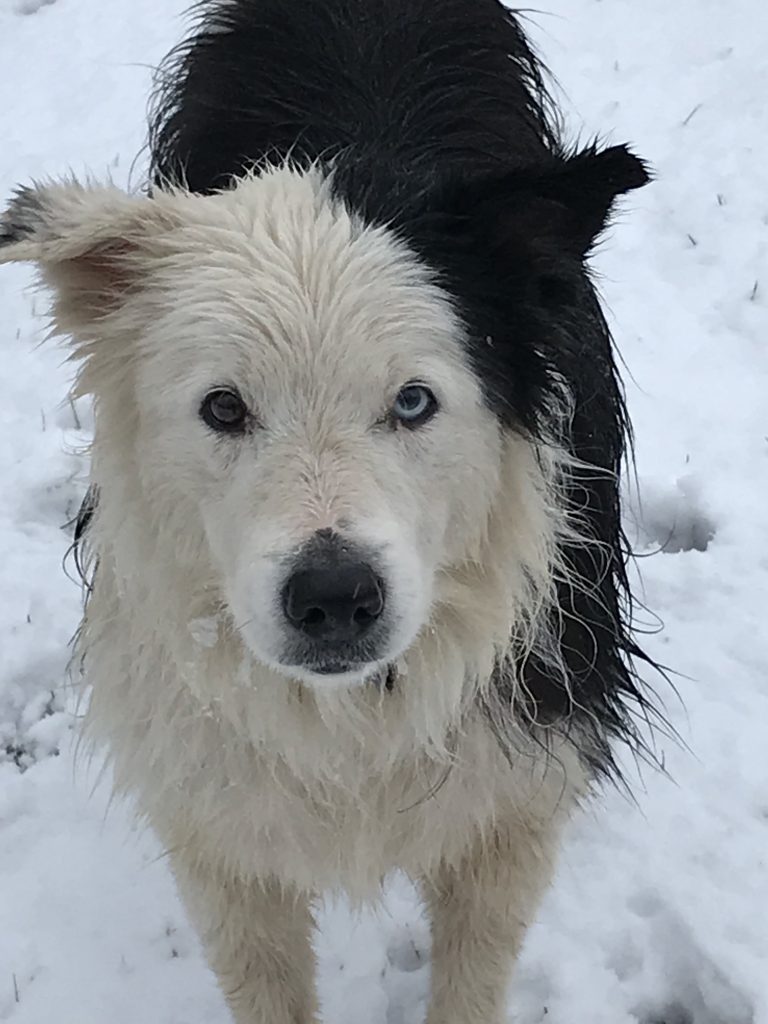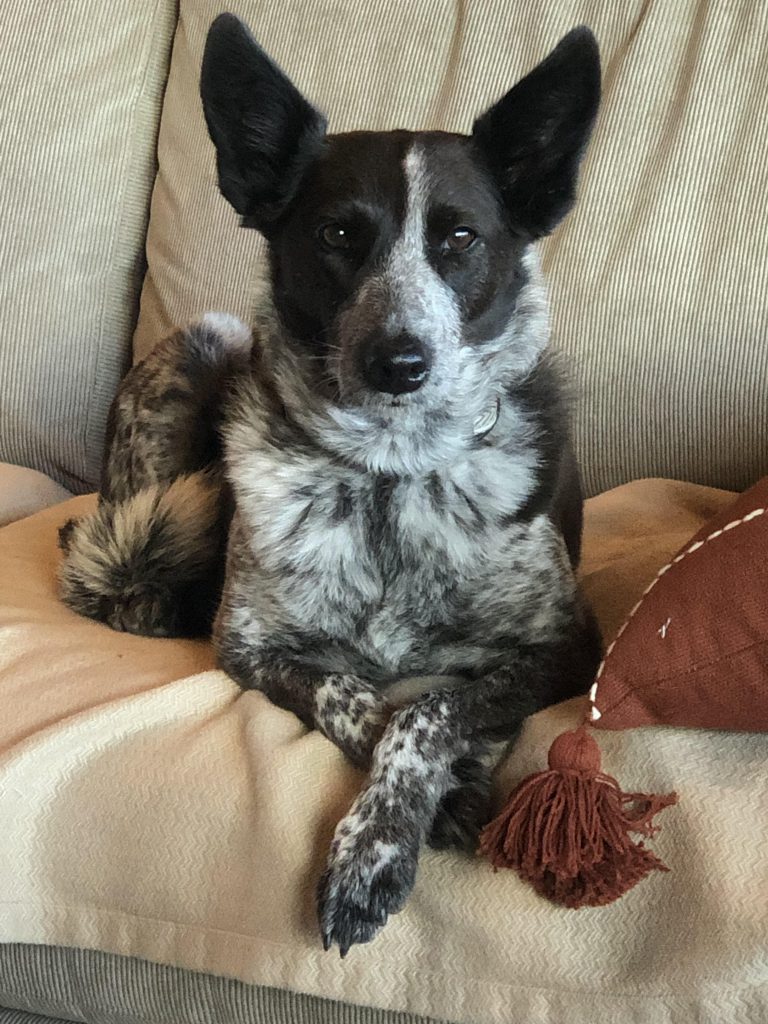Border collies first came to prominence by using their smarts and energy to excel at herding livestock. Today, the breed sits atop the most famous dog-intelligence ranking—and the highly publicized accomplishments of individual border collies like Chaser, who learned more than 1,000 words, burnish the dogs’ brainy reputation. With the help of humans who give them the enrichment they need to be happy, they are capable of impressive feats of mental dexterity.
Here’s a primer for those considering bringing a border collie home, or looking to improve their relationship with the one they already have.
Basic border collie facts
According to the American Kennel Club, border collies usually weigh 30 to 55 pounds and live 12 to 15 years. They can have rough or smooth coats, and will require brushing a couple of times a week—daily when they’re shedding. Border collies’ coats come in a wide array of colors and patterns.
“Should I get a border collie?”
Border collies can achieve great things when challenged, leading to a close, rewarding relationship with the right owner. But if you don’t devote enough time and energy to your border collie, the result can be a miserable, destructive housemate. Working border collies run a lot, and have complex problems to solve every day. Border collie companions may not officially have a job, but they require just as much stimulation.
“They are not just black and white, fluffy, cute dogs,” says Sarah Ruckelshaus, who has led Mid-Atlantic Border Collie Rescue for the past 25 years, “and they have specific needs that most humans are either unable or unwilling to fill.”
Families with children or other animals should be ready to train everyone—canine and human alike—because border collies’ instincts will likely lead them to “herd” others in the home. If your child cannot respect the dog’s space and follow rules, they’re not going to be a good fit with a border collie. Generally, dogs and children should be supervised when they’re together.
When deciding whether to become the human to a border collie, ask yourself what you realistically want out of your dog and what you can give them in return. If you love the idea of spending hours a day giving them physical and mental exercise—not just walks and fetch, but also intricate tasks to think through—then you may be in for a loyal friend who will enrich your life. But if your lifestyle means that you can only go for a couple of walks a day and won’t be able to take part in more than basic training and fitness, you’re probably better off with another breed.
Border collie breed history
Thusly named because they’re thought to have originated on the border of England and Scotland, border collies descended from other British herding dogs. The internet abounds with stories about how today’s sheepdog emerged, and a popular version of events revolves around a single dog named Old Hemp. Various sources say that Adam Telfer, Old Hemp’s owner, was impressed by his dog’s distinctive herding style and ability. He bred Old Hemp, who eventually fathered 200 puppies and now has a memorial in Northumberland citing him as “The father of the modern border collie.”
The AKC recognized border collies in 1995, despite some breed enthusiasts’ concern that this could lead breeders to prioritize border collies’ appearance over their working abilities. The American Border Collie Association calls itself a “working registry,” and encourages breeding for herding proficiency rather than aesthetics.
Fans of films with talking animals may know Fly, from Babe (1995). Real-life notable border collies from recent years include Chaser, often called “the world’s smartest dog” due to her 1,000-plus word vocabulary. Her ability to identify so many different toys and show off deductive reasoning skills came to light due to a partnership with her dedicated human, Dr. John Pilley, a professor at Wofford University in South Carolina. Chaser’s official website says that Pilley stopped teaching her the words for new objects at 1,022 partly because “his wife didn’t want any more toys in the house,” so we can’t be sure how large Chaser’s vocabulary could have ultimately grown. And border collie participants in a recent study outperformed other dogs at learning new-object names, though only a minority of participating border collies showed this ability.
Today, Governors Island in New York City is home to a group of working border collies whose efforts keep geese from soiling the popular public recreational space. The dogs, whose humans work at the Island, take turns staying overnight—with human accompaniment—and chasing away uninvited avian guests.
Border collie personality
Ruckelshaus says that border collies are “independent thinkers where most dogs are not. So they think more like we do. They’ll sort of analyze something and figure out ways to fix it or make it worse depending on what it is.” To some internet denizens, these qualities bring to mind the velociraptor, the super-smart dinosaur from the hit novel and motion picture Jurassic Park. At least one Reddit user painted a hybrid of the two.
All of this is to say that the border collie needs a dedicated owner. While they can be challenging, the AKC ranks them as among the most affectionate dogs, the most playful, the most adaptable, and the most trainable. Ruckelshaus says of Chaser and her human: “He’s an A-type personality, his dog is an A-type personality, and they started working together to solve these problems… it was [their] partnership that made her as special as she was.” But Ruckelshaus also has many stories of partnerships that were not nearly as fruitful. When border collies are not challenged, they get bored. “The dog ends up with some sort of negative behaviors that those people are not able to resolve,” she says, “and so the dog ends up in a shelter and it ends up here” with her organization, in search of a new home.
“She is the best and sweetest dog in the world. She could not be more loved.” — Deb Dwyer-Machiran, mom to 11-year-old border collie, Dominique
Doris Hanson, human to a border collie named Quinton, stresses this point. “Border Collies require a lot of time from their parents,” she says. “Otherwise, they get depressed and neurotic.” While you most likely won’t stretch the known boundaries of border collie vocabulary with your own pup, it’s crucial to treat your border collie like the intelligent, energetic animal that they are.
They’re herding dogs who like to keep flocks together. Shannon Myers remembers her border collie, Mickey, showing this tendency at a pool party. “When all but one kid jumped in for some final goggle adjustments,” she says, “Mickey ran to that kid and nudged him on the back of his legs as if to say ‘Get in there with the others, buddy!’”
Another border collie owner recalls taking her dog, Sparky, to a border collie field trial when he was a puppy, “where he watched other dogs compete by herding sheep while under command from their handlers. “The next day, Sparky came out with me to feed our sheep,” says Marybeth Phillips. “And even though I did not let him in with the sheep he managed to herd them back to the barn by moving up and down and barking on the other side of the fence.
Having said all of this, every dog is an individual, and you won’t know the personality your border collie turns out to have until you’ve spent ample time together. Dogs, just like people, do not always conform to expectations. “I love border collies,” says Laura Felicetti, owner of a border collie named Pivot who she rescued at around eight months, “and I wanted a young dog that could go hiking and mountain biking with me.” It turned out that Pivot had neurological issues preventing him from being as physically or mentally active as the breed can generally be, but he’s a beloved companion to Felicetti.
“Is the border collie the smartest dog breed?”
30 Rock’s Jack Donaghy tells Jenna Maroney that “there are many kinds of intelligence. Practical, emotional… and there’s actual intelligence, which is what I’m talking about.” But many thinkers would agree that to answer whether someone is “smart” you’d first have to define what type of intelligence you’re talking about. So while we may not be able to say for sure whether border collies are, on average, “smarter” than dogs of other breeds, it’s safe to admit that their owners and others have observed remarkable intellectual abilities in the dogs—they’ve learned huge numbers of words and showed a knack for “figuring out” situations by observing them. Dr. Stanley Coren put border collies first in his list ranking working breeds for their ability to understand new commands and their consistency in following them. And an oft-repeated origin story of the modern breed involves Old Hemp’s clever herding method, which suggested a knack for problem-solving. Border collies are definitely well-suited to the work they do, and their active minds require constant stimulation.
Border collie training
While all dogs require physical and mental stimulation, border collies are especially demanding. “We have our adopters give us a training deposit, and we require classes,” says Ruckelshaus. The specifics depend on each dog’s age. “Sometimes it almost doesn’t even matter what the class is.” she says, “as long as the dog is actively participating and the person is as well.” The main thing is to challenge your border collie’s mind. If you don’t, they could become bored, unhappy, and difficult to manage.
When you do train your border collie, you’ll likely find them capable and cooperative—they want to please their humans. “Border collies will not do anything that displeases their mom and dad,” says Hanson.
Ruckelshaus recommends crate training, and says that all of the dogs adopted out by her organization receive it. “[They] might as well be sleeping in the crate,” she says, “so if [they] get up and [they’re] restless… [they’re] still safe.” This, of course, must be in combination with rigorous physical and mental exercise.
Chad Mallam, who owns a border collie named Chappy, taught his pup to communicate through more than barks, boops, and tail-wags. “Years ago,” he says, “I saw a YouTube video of a dog communicating pushing buttons that made certain sounds. Amazingly, I was able to teach [Chappy] to ask for meals, treats, and go potty—and stationed buttons around the house.”
Because of their strong herding instincts, border collies can have reactivity issues. “If you take a dog and put it in New York City, and there’s 59,000 things going on while the dog is walking down the street,” says Ruckelshaus, “it is going to be reactive to all of those things—and that person has to support their dog. They have to help it understand that it should not be reacting to those things, and 99% of people who have border collies don’t get that.” If reactivity is an issue for your dog, read our article about addressing it—and consider working with a professional trainer to help your dog manage life in a world where not everything needs to be herded.
Healthy lifestyle for border collies
Exercise
Your border collie is going to need a lot of exercise. Myers says that when Mickey was younger—he’s around 20 now, so he’s slowed down—“he used to hike 40 to 50 miles a week. We miss him on the trails.” If you’re only going to be able to take your dog on a couple of walks around the block each day plus a few trips to the park during the week, most border collies won’t be right for you. “If you’re flexible,” says Ruckelshaus,” and “you give us the right reasons why you want a border collie and you’re willing to consider a senior, they can handle that sort of exercise.” But most border collies will require much more activity than that for most of their lives.
Joe Duncan, who has an 8-year-old border collie named Charli, says “she loves a lot of exercise and loves to chase the ball—it’s hard to wear her out.” And while many border collies do enjoy fetch, on its own that game may not be enough to tire them out. “It’s fun to play ball,” says Ruckelshaus, “but don’t throw that ball for an hour—because that’s not thinking behavior.” She recommends always working an intellectual challenge into your border collie’s workouts. For example: “Teach them tricks and use the ball as a reward, or play ball in short sessions and do other things in between.”
Samantha Chadwick, who owns a border collie named Norman, also emphasizes the importance of giving border collies a chance to use their minds as well as their bodies. “When we first got Norman, we were extremely focused on making sure he got the physical exercise that he needed as a border collie residing in the city—and we had to learn how to [balance] his physical needs with his mental needs to keep him healthy, engaged, and challenged.”
Border collies may enjoy many different types of exercise. Like humans, they have personal preferences that you’ll discover the longer you get to know them. Joseph Aveni, who has a border collie named Rugby, includes his dog in his active lifestyle: “Rugby just celebrated his sixth birthday,” he says, “and is our constant companion as we road trip, hike, bicycle and even kayak.”
And while border collies may add plenty of exercise to your life, they can also introduce unpredictable wrinkles into your existing routine. Dana Fisher, human to a border collie mix named Buddy, relates this story about her dog: “Buddy would stand on one side of the court near the net,” while she played tennis, “staring the ball down in that way that border collies have. It was so darn cute. Sometimes we would be in the middle of a great volley and Buddy would just grab the ball out of the air and bring our game to a jarring stop. He would be so pleased with himself, it was impossible to get mad.”
Grooming and bathing
Border collies have different types of double coats: some are “rough” and some are “smooth,” but both will hold up well against the elements and their active lifestyles. “They can come inside and be filthy and muddy,” says Ruckelshaus, “and you put them in their crate on a towel—and an hour later they’re dry and there’s no mud on them.” Brushing a couple of times a week—more during shedding season—should go a long way to keep your dog clean and prevent knots in their hair.
New York groomer Ani Corless says that border collies’ double coats shouldn’t be shaved or trimmed too short. The layers provide insulation from both heat and cold, and shaving or cutting too close can affect the coat. “What I do is trim that long stuff on the feet, on the hocks and under the pads,” she says, “sometimes also trimming up the pants area and maybe belly. It gives a clean look and helps them drag less dirt around.”
You don’t have to bathe them too often; only when they seem dirty or start to stink. Trim their nails regularly, and be careful not to cut the quick. Ask your vet to show you the proper nail-trimming technique, and enlist professional help if you’re not sure how to do it.
Common border collie health problems
Hip dysplasia: This is a condition in which the ball and socket of the hip joint do not fit together properly, which could lead to arthritis or degenerative joint disease. Because hip dysplasia can cause your dog pain or cost them the use of the impacted joint, it’s important that your vet pays close attention to your border collie’s hips during checkups. If you notice symptoms like a newly limited range of motion, diminished willingness to move around or climb stairs, hopping, pain, or limping, have a vet check your dog out.
Border collie collapse, or “the wobbles”: Dogs with this condition may become disoriented, walk unsteadily, or fall down minutes after starting intense exercise. Veterinarians are not yet sure what causes border collie collapse, but if your dog is affected you can help them stay safe by managing their activity levels and keeping them cool—the condition is most likely to arise in warm weather. While other conditions with similar symptoms more frequently have long-term effects, dogs who experience border collie collapse tend to recover within half an hour. If you observe symptoms of the issue in your dog, it’s important to seek veterinary advice to differentiate border collie collapse from other possible issues like heat stroke, and to come up with a plan to help your dog live the happiest, healthiest life possible.
MDR1 mutation: This genetic mutation in many herding breeds causes dogs to be extra vulnerable to toxicity from certain medications—including Ivermectin, which is a common active ingredient in heartworm medication. The letters in the mutation’s name stand for “multidrug resistance.” Talk to your veterinarian about the risk to your own dog. And if your border collie may be around livestock that have taken medication with Ivermectin, prevent them from eating their manure, which can still contain enough of the ingredient to cause a dog serious harm.
Progressive retinal atrophy: This is a genetic disease that causes degeneration of the retina and leads to blindness. It can occur in any dog, but border collies may suffer a greater incidence. There is no effective treatment.
Collie eye anomaly: Border collies are among the breeds predisposed to this inherited disease, which can cause blindness and other issues. Dogs with collie eye anomaly experience many physical defects in the development of their eyes, but the degree to which this impacts their vision varies—some can see normally. While collie eye anomaly is not reversible, in some cases laser surgery can help dogs whose retinas have become detached. If you’re concerned about collie eye anomaly, have a veterinarian examine your dog’s eyes. This is a good idea in general—border collies and other dogs can also experience other eye issues, including glaucoma. If you’re bringing home a border collie, ask about their family history and whether they’ve undergone genetic testing for collie eye anomaly.
Epilepsy: Border collies can inherit idiopathic epilepsy, or epilepsy with no apparent underlying cause. Seizures can also be caused by a variety of other conditions. They’re a serious issue, and if they arise you should seek veterinary attention.
Deafness: Border collies can experience early-onset deafness. For information on training and living with a hearing-impaired dog, read our article on the subject.
Trapped neutrophil syndrome: Border collies with this inherited condition cannot fight illnesses effectively because neutrophils, a type of white blood cell, do not make it into their bloodstream from bone marrow. Unfortunately, affected dogs suffer chronic infection, and trapped neutrophil syndrome is fatal. Doctors can detect trapped neutrophil syndrome via genetic testing. According to the University of California — Davis Veterinary Genetics Laboratory, 7 to 8% of border collies carry the gene mutation causing the syndrome, though not all carriers have the disease.
Food and nutrition for border collies
As with any breed of dog, it’s important to feed border collies healthy, complete and balanced food on a regular schedule. Here’s more to consider as you try to make smart dietary choices for them:
Watch their weight: A fresh-food plan makes it easy to feed the right amount of food for a border collie’s age, size, and activity level. Keeping your dog in shape can help maintain their overall health.
Support joint health: A fresh diet that provides balanced Omega-3 fatty acids could be an asset as you seek to ward off joint issues. A pre-portioned fresh food plan also makes it easy to feed the right number of calories every day. This helps maintain a healthy weight (see above), which is another big factor in keeping joints healthy.
High-quality food for high-quality poops: A diet of fresh, lightly cooked food has been shown to be more digestible than processed kibble, and can promote a healthy gut and good digestion (which also means better, smaller poops).
A healthy, fresh diet—alongside ample exercise, training, vet care, and complex problems to think through—is among the keys to giving your border collie a happy life.
Where to get a border collie
If you’re looking to adopt a border collie or a border collie mix, a good place to start is a rescue like Mid-Atlantic Border Collie Rescue.



